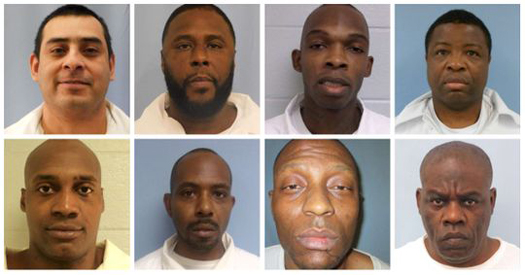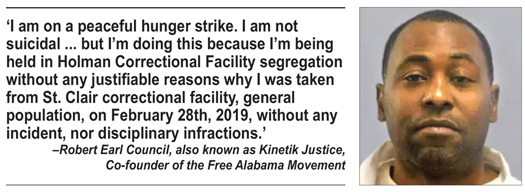By Charlene Muhammad CHARLENEM

Support is growing for Alabama inmates who initiated hunger strikes to protest rights violations, rampant violence, overcrowded prisons, and allegations of inmate abuse statewide.
The latest problems started when several law enforcement agencies raided St. Clair Correctional Facility, located in Springfield, Ala., and despite no rules infractions or disciplinary problems, took 30 men and moved them to at least one other facility, according to an attorney for one of the inmates and prison reform advocates. Nine of the inmates subsequently waged a hunger strike, protesting the move to solitary confinement in the Holman Correctional Facility Security Housing Unit, saying the punishment was without just cause and violated their due process rights. The raid and movement of inmates came in late February.
Robert Earl Council, also known as Kinetik Justice, co-founder of the Free Alabama Movement, was the first to refuse food or liquids for six days inside the Holman Correctional Facility starting on March 7, said activists.
Mario Avila, Antonio Jackson Jr., Corey Burroughs, Earl Manassa, Kotoni Tellis, Tyree Cochran, Marcus Lee and Earl Taylor followed suit on March 18.
“I am on a peaceful hunger strike. I am not suicidal … but I’m doing this because I’m being held in Holman Correctional Facility segregation without any justifiable reasons why I was taken from St. Clair correctional facility, general population, on February 28th, 2019, without any incident, nor disciplinary infractions,” read an excerpt from a statement sent out by men via Unheard Voices from the Concrete Jungle, a non-profit inmate advocacy group.
“I’ve not been involved in any Riots or escapes. … I feel as if my U.S. constitutional rights are being violated and I’m being deprived of my liberties, being placed in segregation without any due process of law [sic],” the statement continued.

The inmates say the strikes were a last resort against Alabama Department of Corrections’ unlawful use of solitary confinement and disregard for its own regulations.At least seven inmates were still in solitary at Holman at Final Call press time and charged the Alabama Department of Corrections with retaliation. A prison official at Holman ordered all running water in each striker’s cell to be cut off, said Swift Justice, co-founder of Jailhouse Lawyers Speak and Unheard Voices of the Concrete Jungle, which advocates for human rights for prisoners across the country.
“As of today all those on the hunger strike at Holman Correctional Facility are being denied water until they eat and will be forced to live in a cell with no way to flush accommodating toilets or consume freshwater. It is also being reported that ADOC is refusing to properly record and report all participating in said strike,” Swift Justice told The Final Call.
Mr. Council, meanwhile, was doing remarkably well and was in good humor and spirits, after a March 15 visit, according to his attorney David Gespass. “I said earlier that his body would fall apart faster than his mind or his spirits, and his body’s doing okay; a little weak, but otherwise, he’s angry and wondering why all this has happened, but otherwise, he’s the same fighter that I’ve known for the last few years,” said the attorney.
Mr. Council had ended his hunger strike, after being told he would be moved back into the general population, said Atty. Gespass. That wouldn’t necessarily be back at Holman, the attorney added. “He says that they made it pretty clear that they don’t want him back there, but we don’t know that yet, and at this point I can’t say how long it’s going to take,” admitted Atty. Gespass.
Atty. Gespass was also unsure March 20 of where his client was, having received a report that Mr. Council had been moved again, and placed in segregation at Limestone Correctional Facility. The attorney was awaiting a reply from Alabama Department of Corrections’ lawyers about his client’s status and whereabouts at Final Call press time.
According to Swift Justice, Mr. Council told him and other supporters that he began another hunger strike March 20 to protest being placed in solitary confinement again for no reason.
“Council also relayed that he has now been notified by Limestone Administration that Commissioner (Jefferson) Dunn and Institutional Director Cheryl Price have now entered him into solitary confinement for an alleged investigative” purposes after previously housing him in solitary for “preventive measures,” said Unheard Voices.
Mr. Council’s supporters feel the Alabama Department of Corrections defaulted on its agreement with Atty. Gespass by not transferring him to general population. “If they’re returning Robert to general pop, that probably means that they’ve decided they really didn’t have a reason to snatch him, but that’s all speculation,” his lawyer said.
He declined to characterize the prison’s moving Mr. Council as a default on their agreement. “It was not an agreement with me. This was just what I was being told by their (corrections department) lawyer, and he told me what he could and so it was subject to change. It’s not like anything was agreed upon. I was told that he was going to be returned to the general population. Then I was told that they’re going through some process, which he couldn’t tell me anything about what the process was or reason for it or anything like that, and that’s where we stand,” explained Atty. Gespass.
Circumstances surrounding the raid and move from the St. Clair facility in the first place are puzzling, Atty. Gespass added. “It’s very, very strange. Apparently, things at St. Clair has been really pretty bad. It’s rife with weapons and drugs, people getting stabbed a lot, and evidently, from what he (Mr. Council) can tell, at least, this whole raid was being set up for a long time. It was being planned, there was a lot of investigation. They were trying to identify people who are causing most of the problems there, all of which makes it particularly odd that he was picked out, because he had been there only three weeks,” said the attorney.
“He has had no disciplinary, hadn’t done anything, and yet, they came in the middle of the night; had them all stripped. They put them in plastic cuffs, apparently threw all their personal stuff in barrels; gave them clothes. He still hasn’t gotten his shoes back yet. He hasn’t gotten any of his clothes back yet and not sure if they’re ever going to be found, and they marched them into a bus and with a convoy of 15 law enforcement cars, drove down to Holman.”
According to Pastor Ken Sharpton Glasgow, of the Alabama-based Unheard Voices of the Concrete Jungle, Mr. Council led 2016 and 2018 work stoppages for better wages and conditions and the other hunger striking inmates participated. And, activists insist, Mr. Council has never been a problem inmate, but he has been an organizer and leader calling for change inside Alabama prisons.
“It’s been several years, and he was out in one prison, the Donaldson Correctional Facility, that’s the name they give. There’s nothing correctional about any of these facilities, but anyway, he was out for about a week in the general population. Then they shook down his cell and they found a cell phone, which his cell mate said was his and nevertheless, they found Robert guilty,” said Atty. Gespass. “They said they told him he violated his probation, which they never told him he was on, and put him back in segregation.”
Mr. Council, who is serving a life sentence without the possibility of parole on a 1995 murder conviction, had already spent 54 months in solitary confinement at Holman from 2014 to 2018 for leading a peaceful work strike there, according to his lawyer. Atty. Gespass told The Final Call his client has been punished and retaliated against since his participation in the work stoppage and other prison strikes.
The Alabama Department of Corrections did not respond to Final Call emails or phone calls for comment.
Activists and advocates accuse the Alabama Department of Corrections of intentionally creating more chaos to justify funding $900 million for three new maximum-security prisons, and scoff at the notion prison officials conducted the initial raid to keep the peace.
Swift Justice argued the system is removing those with the ability to end the violence, forge unity, and take the fight to the criminal justice system and Department of Corrections, where it rightfully belongs. “We’re not animals that the pictures of the media and not just the media, but Hollywood, has created us to be animals. … We’re trying to reestablish our humanity with society because 95 percent of us shall return back to society one day. I say this time and time again, that being that I shall return back to society, what kind of individual would you want me to be? Would you want me to be that rehabilitated individual or would you want me to be that animal that you actually think that I am?” he asked.
“What these brothers and sisters inside Alabama did was they turned around and created Prisoners Against Violence, and they stopped the violence of the killing amongst themselves,” added Pastor Glasgow. “When Robert Earl Council got to St. Clair Correctional Facility, 21 days before this happened, the guards, the correctional officers, praised him, clapped, and was actually praising the fact that he was there on their compound. They knew that people would listen to him and that he would calm it down and stop some of the killing and stop some of the violence.”
He and others hosted events over the March 25 weekend in support of the hunger strikers, including a brunch for formerly and incarcerated individuals and their families, and a march at the capital in Montgomery.
Activists, students, and supporters from across the country have joined a national call-in campaign, pressing the Alabama Department of Corrections to explain why the men were moved, placed in solitary and demanding their release.
James Muhammad, Nation of Islam Student Southern Regional Prison Reform Minister, said part of the problem stems from the federal government’s 2018 takeover of Alabama’s prisons due to overcrowding, decayed facilities, poor health care, inadequate mental health services, and poor conditions for disabled inmates. Inmates use the hunger strikes as a cry for help, said Mr. Muhammad. “Our teaching dealing with self-improvement, when we go in and talk to them, it awakens the people to develop that type of strength and character to make a stand for themselves,” he said.
Attorney Donna Smalley, a spokesperson for the eight hunger strikers who each have their own lawyers, said, “They’re generally what we would call influencers, leaders among the prison population, and they have typically sought to preclude a lot of inmate-on-inmate violence that might otherwise occur. And, so it seems as if these people have been removed from the population because the prison officials want to allow the prisoner-on-prisoner violence to be unchecked so that their argument for the $900 billion for three private prisons is fostered in the public’s mind.”
It’s not just about us, added Swift Justice, saying the Alabama effort is linked to the plight of 2.5 million “other brothers and sisters languishing in prison plantations all across the country.”












